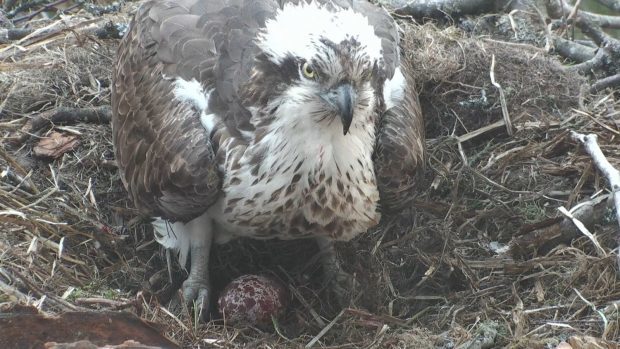One of Scotland’s most famous couples are expecting – and nature lovers will be watching the entire drama unfold on camera.
Female osprey LF15, better known as Lassie, laid her first egg of the season at the Scottish Wildlife Trust’s Loch of the Lowes near Dunkeld on Thursday.
Following an afternoon of fidgeting and nest renovations, Lassie began to show signs of laying in the early evening.
Contractions and heavy panting were observed accompanied by a series of soft chirps, before the egg was finally laid just after 8.30pm.
After laying, Lassie was seen rolling her egg to removes sticks from the nest cup before nestling down to brood for the night.
Lassie and her mate Laddie (LM12) have successfully fledged 10 chicks at the loch since 2015, from just 12 eggs.
Cameras have recorded the raptor couple’s movements since the pair arrived back at Dunkeld nearly three weeks ago.
And bird watching enthusiasts were able to watch footage the egg being laid on the video being live streamed through the Scottish Wildlife Trust website.
Lassie has laid three eggs at her nest, just 200m from the observation hide on the shores of the loch, each year since her arrival and the team are hoping for another two this spring to complete the clutch.
Ospreys were extinct in Britain for much of the 20th century but began to recover in the 1960s.
Now, more than 200 pairs of ospreys breed across the UK every summer.
Sara Rasmussen, Perthshire Ranger for the Scottish Wildlife Trust, said: “At first LF15 seemed a bit bemused by the whole affair.
“She took a while to settle down, but she has sat tight throughout the night, nestling down on the egg to begin incubation.
“With 2019 marking 50 years of both the reserve and breeding ospreys we can’t wait to see what the rest of the season has in store.
“Our team of staff and volunteers are watching around the clock to see what unfolds and protect these amazing birds from disturbance.”
Osprey eggs are laid a few day apart, meaning a full clutch of three eggs could be laid by early next week.
Incubation of each egg takes around 37 days.
